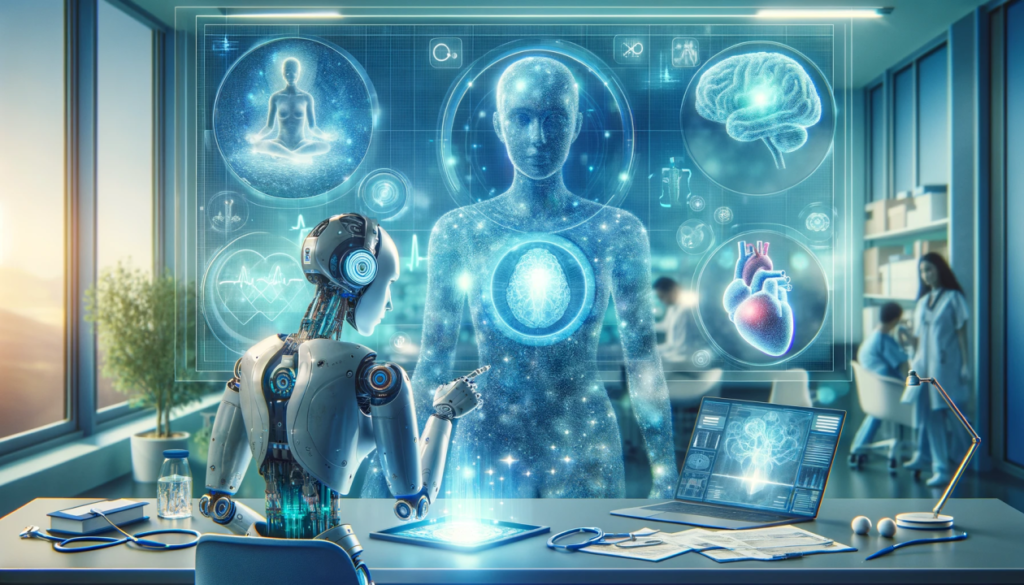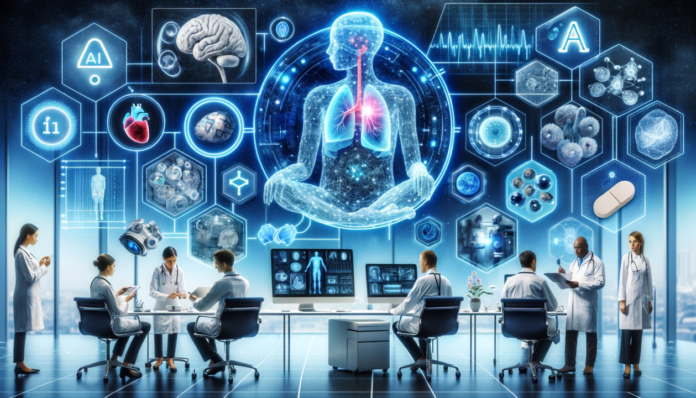AI-Driven Healthcare Innovations landscape, bringing unprecedented innovation to diagnosis, treatment, and patient management. From predictive analytics to personalized medicine, AI’s role is reshaping how medical professionals deliver care. This article delves into the latest advancements, ethical considerations, and the transformative potential of AI-driven solutions in healthcare.
Transforming Diagnostics with AI-Driven Healthcare Innovations
Early Disease Detection
AI-powered tools excel at early disease detection by analyzing vast datasets with unmatched speed and accuracy. Technologies such as machine learning algorithms can detect anomalies in medical imaging, flagging potential issues like tumors or fractures in minutes. For instance, AI systems trained to read mammograms have shown higher accuracy rates than human radiologists, significantly reducing false positives and negatives.

Genomic Analysis for Precision Medicine
AI enables researchers to decode genetic information, leading to breakthroughs in personalized medicine. By examining genetic markers, AI tools can predict an individual’s susceptibility to diseases and recommend tailored preventive measures or treatments. Advances in this field, such as CRISPR technology, are pushing the boundaries of targeted therapy.
Enhanced Imaging Technologies:
Radiology and imaging are among the most affected areas by AI advancements. AI-integrated imaging platforms can enhance resolution, automate reporting, and provide in-depth analysis, reducing the workload for medical professionals.
Revolutionizing Treatment Strategies
AI-Driven Healthcare Innovations Robotics in Surgery
AI-assisted robotic systems are making surgeries more precise and minimally invasive. Robots equipped with AI algorithms can assist in planning surgical procedures and performing complex tasks with high precision. For instance, the da Vinci Surgical System combines AI with robotics, enabling surgeons to perform delicate operations remotely.
Personalized Treatment Plans
AI algorithms analyze patient data, including age, medical history, and genetic makeup, to design personalized treatment plans. This approach minimizes trial-and-error prescriptions and improves patient outcomes.
Improving Patient Care
Virtual Health Assistants: AI-Driven Healthcare Innovations
AI-powered chatbots and virtual assistants are increasingly being used to manage routine patient inquiries, schedule appointments, and provide medication reminders. These tools reduce the administrative burden on healthcare providers and enhance patient engagement.
Telemedicine with AI Integration
Telemedicine platforms are leveraging AI to provide real-time consultations and health assessments. By integrating AI with telemedicine, healthcare providers can diagnose and monitor patients remotely, improving accessibility for those in rural or underserved areas.
Addressing Operational Efficiency
Streamlining Administrative Processes
AI can automate mundane administrative tasks, such as processing insurance claims, scheduling appointments, and managing patient records. This reduces errors and allows healthcare staff to focus on patient care.
Predictive Analytics for Hospital Management
AI tools help hospitals optimize resource allocation by predicting patient admission rates, bed occupancy, and staff scheduling needs. Predictive analytics ensure hospitals operate efficiently, even during peak demand periods.
Ethical and Regulatory Considerations
Ensuring Data Privacy in AI-Driven Healthcare Innovations
The use of patient data in AI systems raises concerns about privacy and security. Ensuring compliance with regulations such as HIPAA and GDPR is critical to maintaining patient trust.
Mitigating Algorithmic Bias
AI algorithms can inadvertently perpetuate biases present in training data. To address this, developers must use diverse datasets and implement robust validation processes to ensure equitable healthcare delivery.
Establishing Transparent AI Systems
Transparency in AI decision-making is essential for building trust among healthcare providers and patients. AI systems should offer clear explanations of how diagnoses or treatment recommendations are derived.
The Future of AI in Healthcare
AI-Driven Healthcare Innovations: AI and Drug Discovery
AI is revolutionizing drug discovery by identifying potential compounds faster and more cost-effectively than traditional methods. Machine learning algorithms analyze molecular structures and predict their efficacy, expediting the development of new drugs.
Wearable Health Devices
Wearable devices powered by AI are enabling continuous health monitoring. From smartwatches to advanced biosensors, these devices track vital signs, detect irregularities, and alert users to seek medical attention promptly.
AI-Powered Mental Health Support
AI is also making strides in mental health care. Virtual therapists, powered by natural language processing, provide cognitive behavioral therapy (CBT) and monitor mood changes, offering accessible support to those in need.
Collaborative Opportunities
Cross-Industry Partnerships
Collaboration between tech companies and healthcare providers is driving innovation. For example, partnerships like those between Google Health and major hospitals are developing AI tools to assist with medical imaging and patient data management.
AI-Driven Healthcare Innovations: Educational Initiatives
Healthcare professionals are being trained to use AI tools effectively. Medical schools and organizations are incorporating AI education into their curricula to prepare future practitioners for AI-integrated healthcare environments.
Explore more insights on technological advancements and innovations on platforms like ScopeTrends and Cybozap. Learn how these tools can reshape industries and enhance efficiency.

